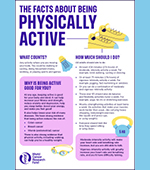 Can physical inactivity increase your cancer risk? You probably know that being active can help keep your heart healthy – and the good news is that it can also reduce your risk of cancer.
Can physical inactivity increase your cancer risk? You probably know that being active can help keep your heart healthy – and the good news is that it can also reduce your risk of cancer.
We have strong evidence that being active reduces the risk of three cancers:
Moderate physical activity (such as brisk walking) as well as vigorous physical activity (including running, fast cycling and aerobics) decreases the risk of colon, womb and post-menopausal breast cancer. Being vigorously physically active lowers your risk of pre-menopausal breast cancer.
 Free physical activity factsheet
Free physical activity factsheetNeed help getting started? Our factsheet has all you need to know about keeping active and practical tips to help you get more active in your everyday life.
Scientists are still investigating exactly how physical activity reduces cancer risk, but studies show that regular activity can help keep your hormone levels healthy. This is important as having high levels of some hormones can increase your cancer risk.
Being active can lower insulin resistance (a condition where the hormone insulin becomes less effective at lowering blood sugar levels). Insulin resistance can increase levels of inflammation in the body which has been shown to have a role in cancer development.
Being active helps move food through the digestive system more quickly, reducing the amount of time that any cancer-causing substances are in contact with the lining of the bowel.
Being overweight or obese is linked to many types of cancer. There is strong evidence that aerobic physical activity, including walking, can help you maintain a healthy weight.
Conversely, being sedentary, and particularly screen time, such as watching television, spending time on the computer at work or playing video games, is a cause of weight gain, overweight and obesity.
Screen time is typically associated with being inactive, being exposed to the marketing of food and drink that promote weight gain, and snacking on high-calorie food and drink.
> Our Recommendation is to be physically active – find out how
> Living an active life: our free booklet can help you move more
We should aim for at least 150 minutes of moderate intensity activity a week. However, many of us are not meeting these guidelines.
| Nation | % of men meeting guidelines | % of women meeting guidelines |
|---|---|---|
| England | 63 | 60 |
| Wales | 58 | 49 |
| Scotland | 71 | 61 |
| N Ire | 61 | 51 |
1 Physical activity statistics come from the Active Life Adult Survey 2019-20, Sport England, the National Survey for Wales 2019-20, the Scottish Health Survey 2019, and the Health Survey Northern Ireland 2016/17.